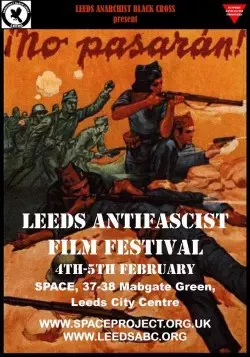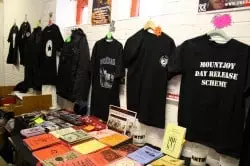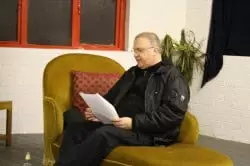 Georgia Halston covers the Leeds Antifascist Film Festival, which ran for the weekend of the 4th and 5th of February. Below is coverage from Saturday. Watch this space for an equally fascinating and pleasurable read in her account of Sunday’s activities.
Georgia Halston covers the Leeds Antifascist Film Festival, which ran for the weekend of the 4th and 5th of February. Below is coverage from Saturday. Watch this space for an equally fascinating and pleasurable read in her account of Sunday’s activities.
A stunning effort and devotion to a cause was displayed by the Leeds Anarchist Black Cross this weekend in the form of Leeds Antifascist Film Festival.
An early start on an icy cold Saturday morning had me pleasantly surprised when entering the Space Project on Mabgate Green in Leeds. Not only were my temperature induced preconceptions of poor turnout wrong, the welcome from organisers and general atmosphere in this make shift cinema/board room was in complete juxtaposition to the grippingly brisk conditions.
Technical teething problems at the outset made it possible for the purchase of a warming tea and vegan cake (the likes of which you can’t buy at Starbucks!) as well as a chance to have a chat with my fellow festival-goers. After some technical tinkering we were all seated for the first film; a Polish-made documentary, Auschwitz – Recollections of Prisoner 1327, a dramatic account of life on one of the most infamous concentration camps, told through the memories of Kazimir Smolen. Smolen was said to be the world’s most foremost authority on German concentration camps and played an imperative role in Nazi war crimes trials. A smart move for film number one, for me at least: a refresher course in Western Fascism 101.
 A smooth transition was made from looking back at Auschwitz Birkenau to its social significance today. Javaad Alipoor gave us a talk about how he and his organisation had educated West Yorkshire teenagers about the atrocities by taking them to the scene of the crime in Oswiecim Poland. Javaad spoke mainly of his work with young people and giving them an insight into political ideologies. In an entertaining and anecdotal fashion, he spoke of the sensationalisation and the ‘emotional blackmail’ occurring at the camp today and preached the other side of Auschwitz, with a large amount of audience participation the talk is well worth a listen and can be found here.
A smooth transition was made from looking back at Auschwitz Birkenau to its social significance today. Javaad Alipoor gave us a talk about how he and his organisation had educated West Yorkshire teenagers about the atrocities by taking them to the scene of the crime in Oswiecim Poland. Javaad spoke mainly of his work with young people and giving them an insight into political ideologies. In an entertaining and anecdotal fashion, he spoke of the sensationalisation and the ‘emotional blackmail’ occurring at the camp today and preached the other side of Auschwitz, with a large amount of audience participation the talk is well worth a listen and can be found here.
After more tea and refreshments organisers presented the 2001 film Conspiracy, a chilling true story and recreation of the Wannsee Conference where the Nazi Final Solution phase of the Holocaust was devised.
As the snow started to fall, the bleak outlook outside was mirrored by the stark portrayal of the Edelweiss Pirates in the 2004 film of the same name. The film follows the story of a group of young Edelweiss Pirates, youngsters in Germany opposed to the Hitler youth, in Cologne. Beautifully shot this wartime film puts a face to the resistance of German youth.
The 43 Group was the next short documentary shown and told the story of the young Jewish servicemen and women returning from the war to see fascism rearing its ugly head on their own streets. The documentary mainly featured interviews from those now elderly people. Although the viewer can’t help but feel an endearing emotional response to oldies, the film’s messages shine through and remind us that these senior citizens were heroes of their time do not conform to the fallacy of their cutesy ageist stereotype.
 Next on the bill – Antifascist recollections from the 1970s. Recited by an event organiser were the unpublished memoirs of imprisoned antifascists involved in antifascist actions. Taking place in various locations around the country, colourful events were described in equally colourful language.
Next on the bill – Antifascist recollections from the 1970s. Recited by an event organiser were the unpublished memoirs of imprisoned antifascists involved in antifascist actions. Taking place in various locations around the country, colourful events were described in equally colourful language.
A guest presenter was next ushered to front of stage to convey his personal recollection of an event later referred to as ‘The Welling Case.’ With visual aids and concise articulation of the scene the speaker prescribed to the audience his side of the story and outlined how 22 antifascists were prosecuted on ‘trumped-up conspiracy charges’ and how 2 remain imprisoned. He explained how in the process of the trial, an antifascist organisation was shut down and how the 2009 incident was a perfect example of “politically motivated prosecution”.
By about 6.30 the beer was now flowing and the general ambience was one of a more fun and easy going nature as we sat down to watch Spinach For Britain, a Pop-Eye cartoon unreleased at the time and place of its making: 1943 “neutral” America, due to its propagandistic nature, but was released finally in 2003.
Following on in the same spirits was top antifascist comedian Bod Green; this one-man humour mill had his audience in fits of laughter for the duration of his boisterous animated act, reminiscent of an antifascist Ross Noble. Bod littered his set with anecdotes, original humour and some genuine 1930s nuggets of hilarity.
Saturday ended with final film The Army of Crime, for which most of the audience stayed. Described as “the real Inglorious Bastards”, this French war-drama is based on a true story and follows a young group of Parisian rebels who, dubbed by the Nazis as “The Army Of Crime”, fight against the Nazi occupation, ending with their own demise.
Georgia is a freelance creative, who has worked on Leeds Digital Festival and organised Snapshot Leeds. You can find her on Twitter @georgiahalston and see her blog, A Georgian Guide To Casual Whimsy here .
‘Emotional blackmail’….can you expand on that?
If you click on the link to listen to the whole talk, Javaad explains exactly his stance on the use of Auschwitz Birkenau today. The talk is really insightful and I couldn’t put it any better than he does, give it a listen!
Really interesting and well-written article Georgia.